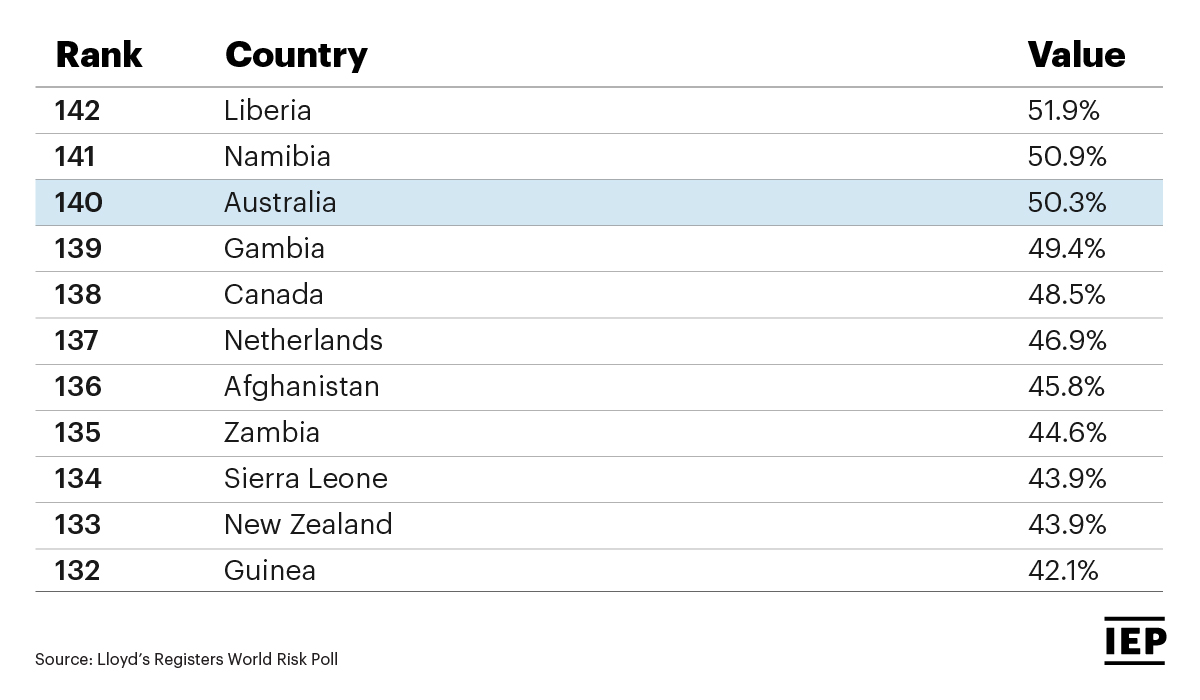Lloyd’s Register World Risk Poll Snapshot
The Lloyd’s Register Foundation World Risk Poll is an ongoing project in which 150,000 people in 142 counties are asked 75 questions relative to their experiences and perception of risk. The poll, first conducted in 2019, sets an important baseline from which changes of experiences and perception of risk in a post COVID world can be measured. Currently the Institute of Economics and Peace is analysing the first data set and each week we offer a snapshot of what we’ve learned so far.
Australia
Australia calls itself the ‘lucky’ country., and according to most data the aphorism seems true. Australians are generally richer, more educated, and live longer and more peaceful lives than most other nationalities.
Lloyd’s Register Foundation World Risk Poll data suggests, however, that Australia is uniquely affected by mental health issues and also that the lucky country is less concerned about mental health issues than most other countries.
One of the 75 questions in the poll asks whether the respondent, or someone they know personally, has suffered serious harm due to mental health issues in the last two years and more than 50% of Australians said they had. Only two other countries in the world, Namibia and Liberia, had more respondents in the affirmative.
The poll necessarily can’t factor in local mental health attitudes and definitions, but when comparing the Australia poll data to nations that may have similar attitudes to and definitions of mental health, like France (23.2%) Germany (32.2%) the United Kingdom (39.8%) and the United States (40%), we find that Australia still reports very high levels of mental health harm.
Australia is also an outlier when you compare the experience of mental health and concern about mental health.
The poll asks respondents whether they think mental health will cause them serious harm in the next two years, and generally responses to this question correlates strongly to the experience of mental health, with most countries reporting high levels of mental health harm also reporting a great deal of concern about future mental health harm.
Only 17.2% of Australian respondents said they were very worried about a mental health causing them serious harm however, with only 11.9% of Australian men saying they were very worried. This put Australia in the bottom half of countries.
This disparity between mental health experience and mental health worry is also found with Canadian, New Zealand and Dutch respondents.
The poll asks a series of questions about the experience of and worry about suffering violent crime and about a lack of safe drinking water or food, and these questions generally correlate with reported mental health harm.
Australian respondents however, as well as respondents from Canada, New Zealand and The Netherlands, do not show a strong correlation between concern about violent crime and food and water, and mental health harm.
Australia, and the other countries mentioned, report very low levels of violent crime and do not report problems with food and water insecurity, but they do report high levels of mental health harm.
The Lloyds data was collected before the first COVID cases emerged in Australia and new Lloyd’s Register Foundation World Risk Poll data is due in 2022. This data will uniquely show how COVID has affected mental health in Australia, and around the world.
